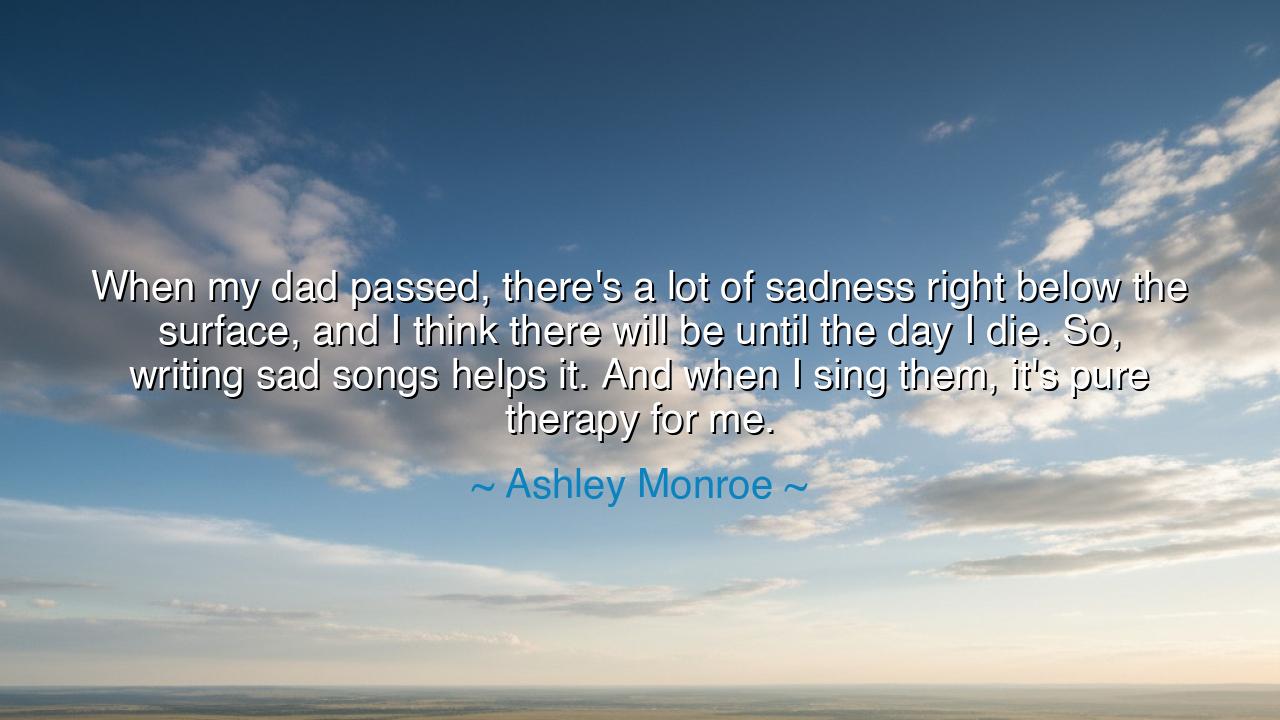
When my dad passed, there's a lot of sadness right below the
When my dad passed, there's a lot of sadness right below the surface, and I think there will be until the day I die. So, writing sad songs helps it. And when I sing them, it's pure therapy for me.






Hear the words of Ashley Monroe, spoken with the voice of grief and healing entwined: “When my dad passed, there’s a lot of sadness right below the surface, and I think there will be until the day I die. So, writing sad songs helps it. And when I sing them, it’s pure therapy for me.” In this confession is found one of the deepest truths of human existence: that sorrow does not vanish with time, but becomes a river running beneath the skin, always near, always ready to rise. And yet, through art, through song, through the act of giving voice to pain, the unbearable weight of sadness can be transformed into something that heals.
From the dawn of civilization, the ancients have known this truth. In the psalms of David, grief is poured into words, and the cry of anguish becomes a hymn of beauty. In the laments of Sappho, love lost and sorrow endured are given shape in verse that still touches the hearts of generations. Monroe stands in this long lineage: her sad songs are not mere entertainment, but sacred vessels, carrying grief from her own soul into the ears of others, where it becomes a shared burden, lighter because it is no longer borne alone.
The death of a father is one of life’s most profound ruptures. The figure who gave guidance, protection, and strength departs, and in his absence remains an emptiness that no words can fill. History reminds us of this wound in the story of Alexander the Great, who, upon the death of Philip of Macedon, was thrust into both sorrow and destiny. His mourning was fierce, and though he rose to conquer empires, the shadow of his father’s loss walked with him all his days. So too with Monroe: she admits that the sadness will not depart, that it will remain until she herself passes. This is no weakness, but truth—the bond of blood and love cannot be severed by time alone.
Yet the human heart is not made only to suffer. It is made to transmute suffering into meaning. This is why Monroe writes, why she sings. For in the act of singing, sorrow is lifted from silence into sound, and silence is the heaviest prison of grief. The ancients turned to ritual—funeral dirges, mourning chants, laments sung in public squares—not only to honor the dead but to heal the living. In the same way, when Monroe sings her sad songs, she performs a ritual both personal and universal: she honors her father, she acknowledges her sadness, and she heals herself and those who listen.
Her words reveal also the nature of therapy. True healing does not mean erasing pain, but finding a way to live with it, to give it space, to allow it to breathe. To suppress grief is to let it fester; to express it is to allow it to transform. Just as the ancient Greeks believed that tragedy cleansed the soul through catharsis, Monroe’s music becomes a channel through which grief is released, leaving behind not despair, but peace, if only for a time.
The lesson is profound: do not hide from grief, do not bury sorrow so deep that it consumes you from within. Instead, find your song, your poem, your prayer, your craft. Let it be your therapy. For though grief may never depart, it can be transformed into beauty, into strength, into connection with others. What once seemed unbearable may become, through expression, a source of hope for those who suffer the same.
Practical action follows: if you carry sadness near the surface, do not silence it. Write it, sing it, speak it, paint it, or share it with those you trust. Transform your grief into creation, and in doing so, you will not only heal yourself but offer healing to others. For in the act of expression lies liberation, and in the act of sharing lies communion.
Thus Ashley Monroe’s words, though born of personal sorrow, become an ancient teaching: that loss does not leave us, but art allows us to live with it. To sing the sad song is not to remain in darkness, but to light a small fire within it. And in that fire, we find not only remembrance, but also the strength to continue walking, carrying grief as part of the great human journey, dignified and transfigured by song.






AAdministratorAdministrator
Welcome, honored guests. Please leave a comment, we will respond soon